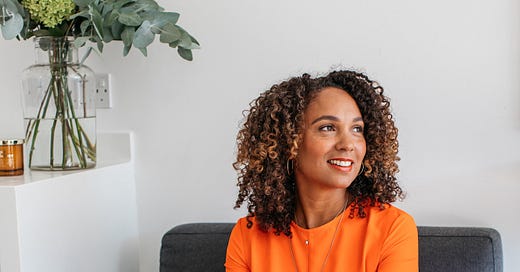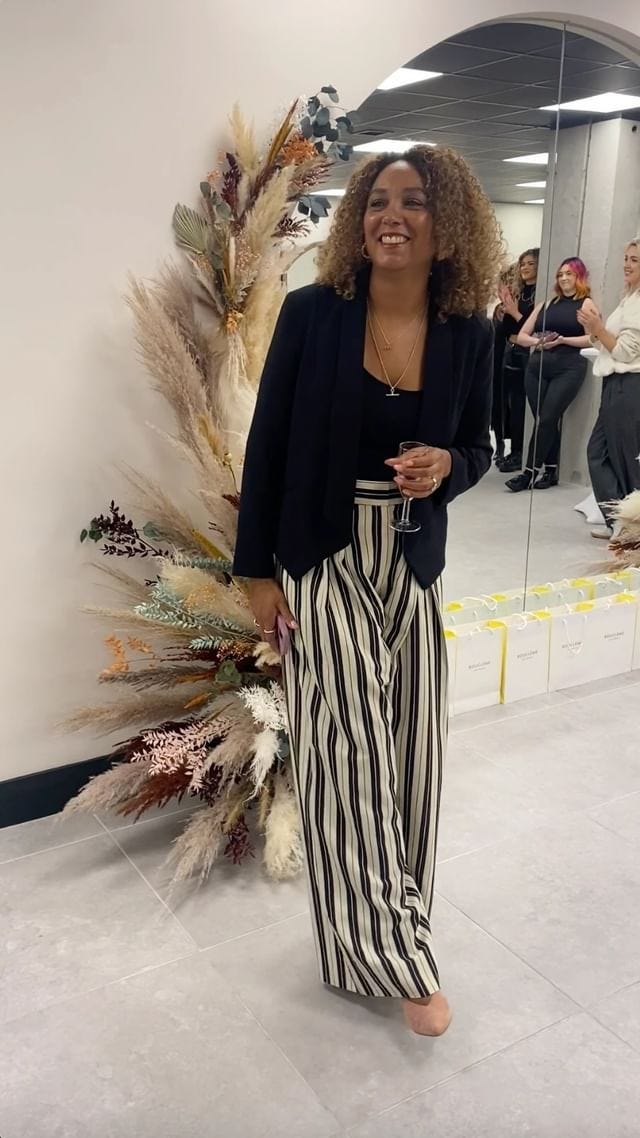Michele Scott-Lynch: “Arriving in Ireland feels like home”
The Bouclème founder on not knowing her history, seeing echoes of her past in her daughters and feeling like a fraud
Hi, welcome back to Mixed Messages! This week, I’m speaking to Michele Scott-Lynch, who is of mixed-Jamaican and Irish heritage. Michele struggled with her curly hair growing up, but seeing her daughters face the same issues pushed her to make a change. Not finding plant-based products to suit her needs, she founded Bouclème, the haircare range that takes curls seriously. Read her story below.
How do you define your identity?
I describe myself as mixed. My mother was born in Jamaica, she came over to the UK when she was nine years old and has never really been back. My father was Irish, they met in the army because that’s what people did back then to leave home.
My father died when I was two, so I was brought up by my mum and my nana. I identify as Black, but I grew up in South Croydon, which was a really white area at the time. I was one of the handful of Black people in my school, so I knew I was different. That was really difficult.
In the ‘70s and ‘80s, I was called every name you could ever imagine. I’ve been called ‘bounty,’ but then never felt like I fit in with my white friends. As a young girl in school, I wished I was white. I’m OK with it now, I guess as you get older you just feel stronger in yourself.
I grew up with these really strong Black women, then I’d go and visit my family in Ireland and feel even more different. I got called all sorts of names there, even though arriving in Ireland feels like home. My family is so loving and never made me feel anything less than part of the family.
It sounds like your sense of self has changed over time.
Definitely. When my Nana and family came over from Jamaica, they were very Victorian in their ways. England was the motherland and it was about fitting in. My grandad started one of the first interracial clubs in Clapham, but he wanted his kids to fit in.
I didn't really learn much about my culture outside of food and music. I didn’t learn it from my mum, I certainly didn’t learn about it at school. Black History Month didn’t exist. I met a friend from Trinidad in my 20s and we’d go to Notting Hill Carnival together. I learned my Black culture through her.
I had no idea that I was missing out on all of this information because I was around Jamaican food and music, but not the history. I didn't understand that there were amazing things that Black people were doing centuries ago.
When I had my kids, who are mixed, I was all over that. I really wanted to make sure that they understood where they came from.
I find that my guests often speak to their children about mixed identity but never had that conversation with their parents – was that the case for you?
Yes. My mum always felt it was important that I knew my Irish family, so I feel like that’s how she addressed the mixedness. I don't remember having any profound conversations about being mixed.
Can you tell me about the journey of embracing your hair?
My mum didn’t understand my hair – she relaxed her hair and knew how to braid, but she didn’t know what to do if I wanted to wear it curly. When I first started embracing my curls, my Nana was like ‘what is this mess?’
I hated my hair throughout my teens and 20s. I’d never wear it down, there weren’t the right products for it to work. I basically chemically straightened it. Then when I read the Malcolm X autobiography, there was a whole section about the chemical relaxation process as a form of self-degradation in order to conform to this sleek, straight-haired vision of Western beauty.
When I read it, I was like ‘that is exactly what I'm doing.’ I vowed from that day on that I would never straighten my hair again, and I never did.
Then came the journey of trying to find products that worked for my hair. Nobody was creating anything for curly hair. If there was anything, it was in America. I've always had quite a natural approach to life, so I’m always looking for plant-based products too. Then one day my eldest daughter came home from school saying that she hated her hair. It was history repeating itself.
I wanted her to have a different story, so I created Bouclème. I feel like everybody should have the opportunity to feel empowered, authentic, beautiful and confident.
How else did you start to feel closer to your heritage?
I took myself to more exhibitions that celebrated Black culture. I sometimes feel like a fraud because I love dance music whereas my daughter loves dance hall. I always had that thing, ‘am I Black enough?’ I don't feel I'm white enough because I know I definitely am not.
I'm always going to be different and my experience of society is different to somebody who is Black. I’ve had privileges, told I ‘wasn’t so bad’ by white people, but there’s a sense I'm never going to be accepted fully by Black people. They’re not going to see me as the same. That doesn’t mean they don’t have respect for me.
Something I’m always wondering is if being mixed and knowing multiple things can be true at the same time makes us more open and curious. Do you feel like that?
Definitely. I can see that in my kids as well, this curiosity about different cultures… The conversations that we can have with white people and Black people give us a blessed position to be in.
I can observe from both sides because I understand both sides. That’s the best thing about being mixed for me.
Can you sum up your mixed identity in one word?
Confusing. It was confusing for me as a child. How people respond to you as a child form the opinions you have of yourself. I don’t feel confused now.
Next week, I’ll be speaking to comedian Esther Manito. Subscribe to get Mixed Messages in your inbox on Monday. Shop Mixed Messages on Etsy now – the perfect Christmas present!
Enjoy Mixed Messages? Support me on Ko-Fi! Your donations, which can start from £3, help me pay for the transcription software needed to keep this newsletter weekly, as well as special treats for subscribers. I also earn a small amount of commission (at no extra cost to you) on any purchases made through my Bookshop.org and Amazon affiliate links, where you can shop books, music and more by mixed creators.
Mixed Messages is a weekly exploration of the mixed-race experience, from me, Isabella Silvers. My mom is Punjabi (by way of East Africa) and my dad is white British, but finding my place between these two cultures hasn’t always been easy. That’s why I started Mixed Messages, where each week I’ll speak to a prominent mixed voice to delve into what it really feels like to be mixed.







